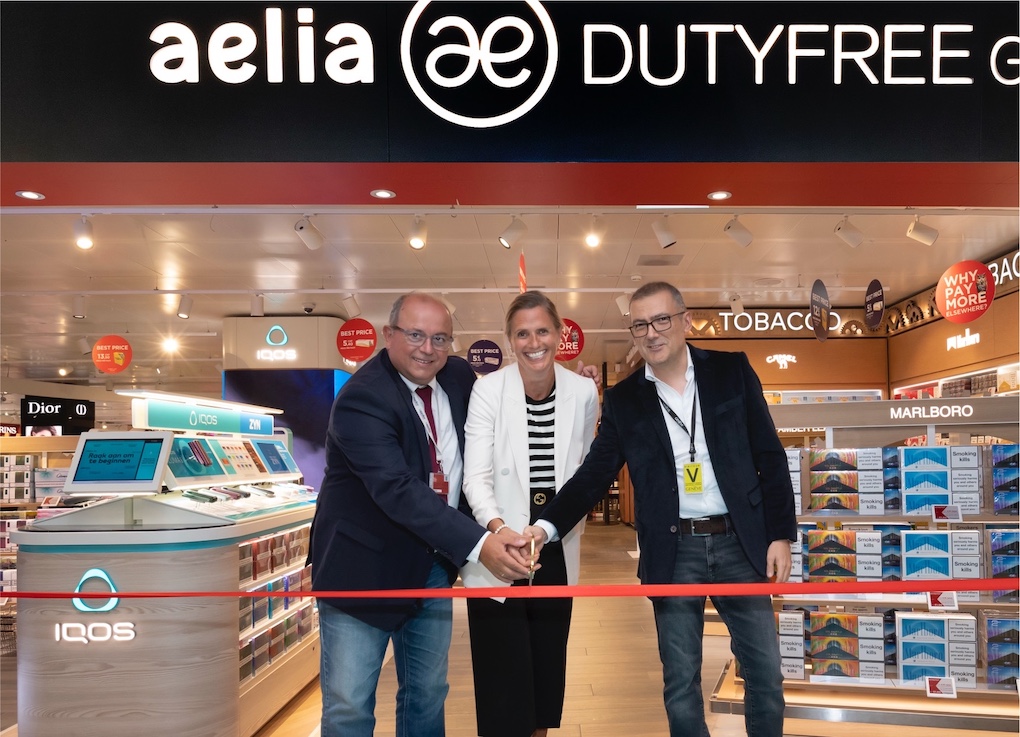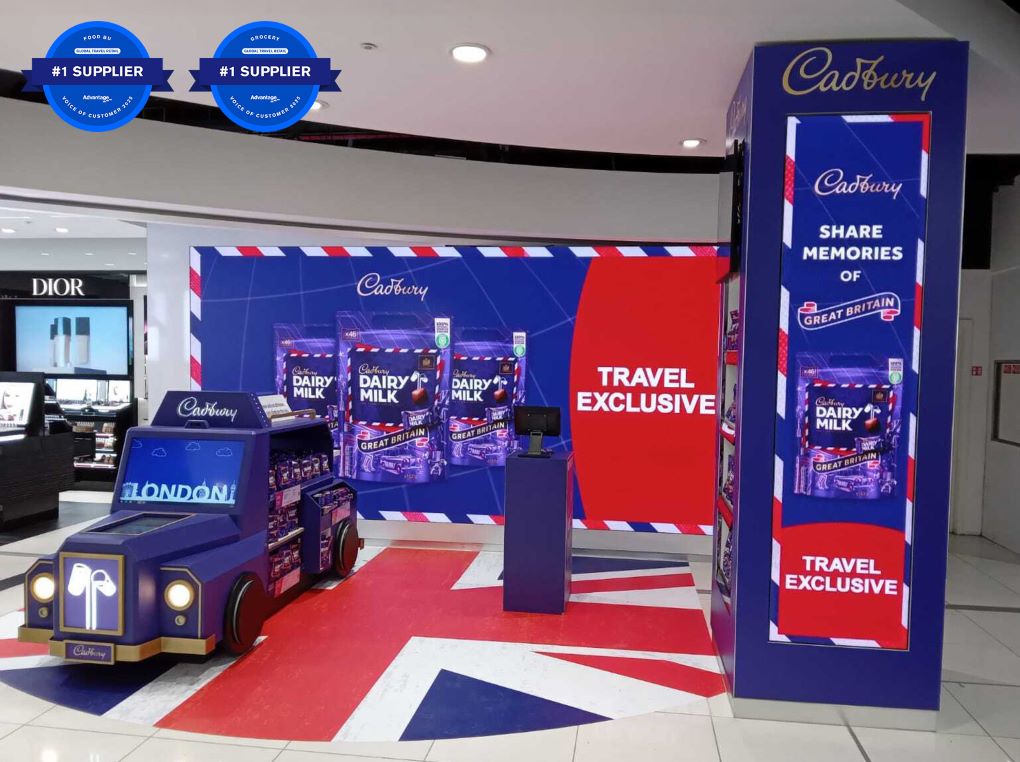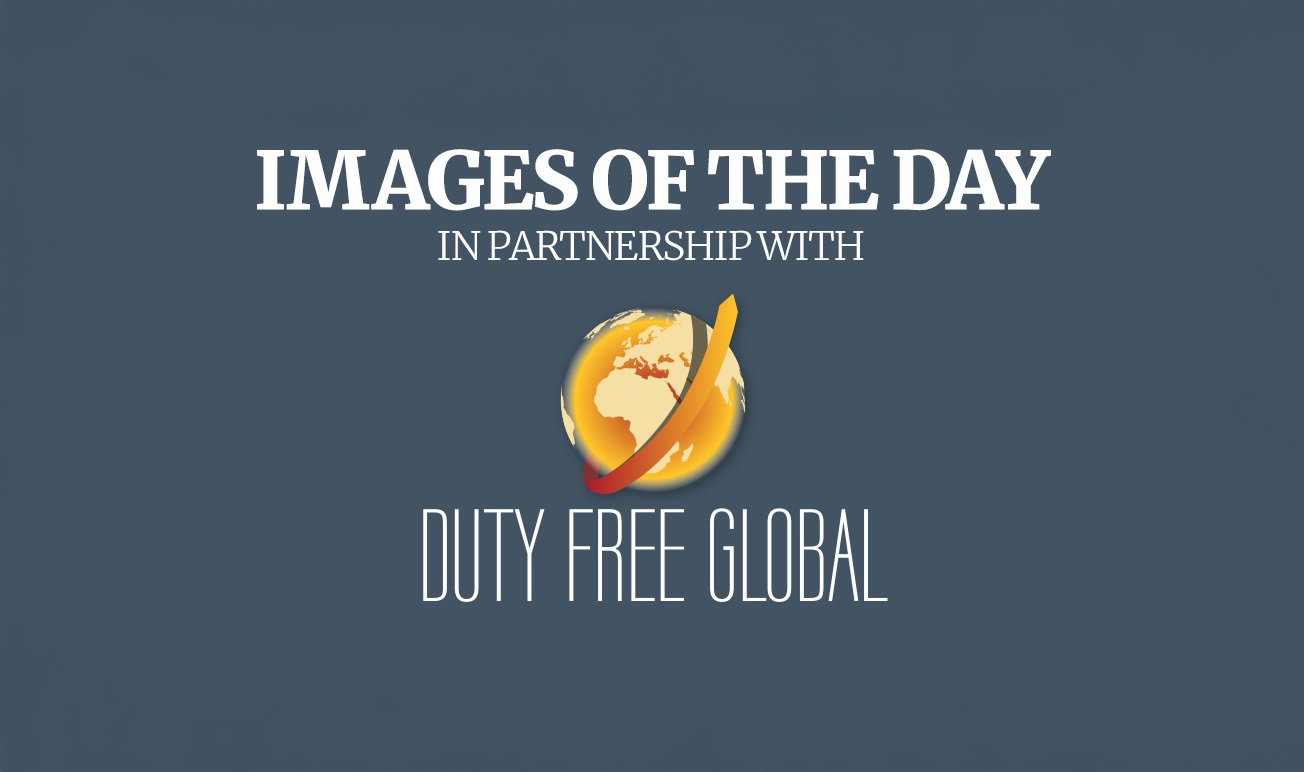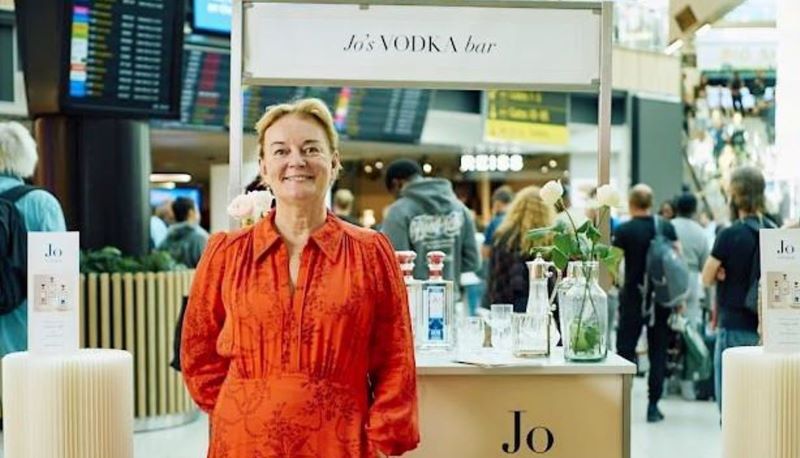Danish jewellery brand Pandora recently rewarded its frontline sales staff at Cyprus Airports Duty Free of Larnaca International Airport for delivering excellent customer service.
Fani Pediou and Mariana Nikonenko scored 100% for Wave 1 of Pandora’s 2014 mystery shopping programme – the first time a perfect score was ever achieved by a team in travel retail.
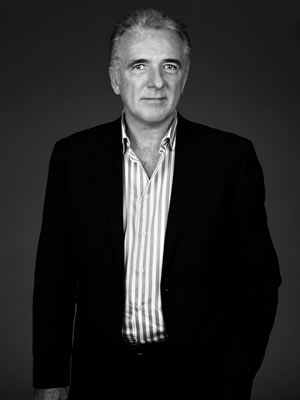 |
“Customer service is at the heart of the Pandora brand and I am extremely proud of this amazing result“ |
Julian Mullins Vice President Travel Retail Pandora |
Commenting on the achievement, Pandora Vice President of Travel Retail Julian Mullins said: “Customer service is at the heart of the Pandora brand and I am extremely proud of the sales associates Fani and Mariana and indeed all at Cyprus Airports Duty Free for this amazing result, our first 100% mystery shop results in travel retail.
“What makes this also extra special is that Larnaca was our first airport shop-in-shop location when we started Pandora Travel Retail some six years ago – what a long way we have come since then,” he added.
As part of its effort to raise customer service standards, Pandora regularly enlists mystery shoppers who evaluate its sales associates in both the domestic and travel retail markets. Two waves are held a year, spanning a three-month period, with two visits per wave.
Pandora Visual Merchandising & Training Manager Andrea Lancaster, who heads up the training team for global travel retail, noted: “Travel retail is very different from the domestic market – they’ve been doing this for much longer and are a lot more established than us [in travel retail] – so for us to achieve the first 100% score was absolutely amazing. Hopefully going forward we will get even more 100% results for travel retail.”
Staff are evaluated based on the “˜Pandora Way of Selling’, a three-step sales process that forms part of their training and which all customers have to be led through when they enter Pandora stores.
“We believe that it is important that every customer gets the same brand experience in all our stores – whether they are in Melbourne or London,” Lancaster emphasised.
To accomplish this, staff must apply the three steps – Embrace, Unlock and Lock. “This process begins from the moment the customer comes into the shop,” she explained. “From how they are acknowledged – e.g. they have to be greeted or smiled at within the first 30 seconds upon entry, even if staff are busy – all the way to the finalisation of the sale; how the product is packed and whether customers are thanked and asked to “˜like’ Pandora’s Facebook page or join the Pandora Club.”
Achieving a perfect score is not easy, Lancaster admitted. “Fortunately for us, at Larnaca Airport we have two girls who are like gold dust – they can sell ice to an Eskimo. They know the products inside out and they absolutely love Pandora. Even if they haven’t got a product that the customer is looking for, they are able to find a way to sell another product.
“An important element in the Pandora sales process is storytelling, about life experiences and unforgettable moments, and they always find a story for every single charm – that is why their sales have gone through the roof,” she added.
As a reward for their efforts, Pediou and Nikonenko were presented with an honorary plaque and an all-expenses paid holiday to Bangkok, Thailand, last month* during which they got to visit Pandora’s crafting facilities – Pandora Production Thailand (PPT).
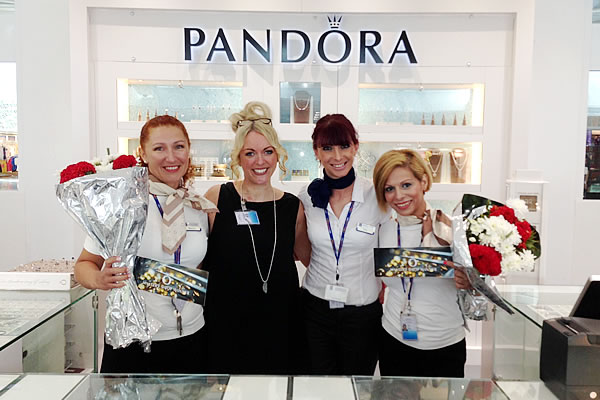 |
Pandora Visual Merchandising & Training Manager Andrea Lancaster (second from left) describes the two mystery shop winners, Mariana Nikonenko (far left) and Fani Pediou (far right), as “gold dust” who can “sell ice to an Eskimo” (photo: Aer Rianta International) |
Sales training at Pandora
Pandora offers extensive sales training to 35,000 people at approximately 10,000 points of sale – including 1,200 concept stores – in more than 80 countries around the world. These include staff in both Pandora owned and operated stores and stores run by its retail partners and franchisees.
Training programmes cover topics ranging from Pandora-specific knowledge, to jewellery and material understanding, professional psychology, and skills and techniques. According to Pandora, over 50 in-house trainers provide coaching and face-to-face training, classroom training sessions, roadshow training events, and webinars.
To supplement face-to-face training, the company has also developed Pandora on Demand (POD), a customised e-learning portal where all employees can access training courses and learn about Pandora’s heritage, culture and values; its Corporate Social Responsibility (CSR) and ethics initiatives; the organisation; and its products. In 2013, a record 312,000 courses were completed on the POD, and it was named “˜Most Impactful Training Programme’ at the 2013 Cornerstone Client Excellence Awards.
The POD has been very successful in domestic markets and will be particularly useful for travel retail with its potential for distance learning, Lancaster noted.
Pandora is introducing a newly improved training programme for its travel retail locations, with Pediou and Nikonenko the first to test it out. “In 2015 we want to take things to the next level and make sure that all our sales teams can perform up to Fani and Mariana’s standards,” she said.
Staff training and the CSR link
 |
“We want our staff to be able to tell our consumers that they can actually trust the Pandora brand“ |
Claus Teilmann Petersen Vice President Group CSR Pandora |
At Pandora, the importance of training goes beyond just selling products. “We believe that CSR and our aspiration to offer high quality and genuine jewellery go hand in hand,” said Pandora Vice President Group CSR Claus Teilmann Petersen, citing the company’s CSR policy. “Responsible business practices and social awareness have always been part of Pandora’s DNA and they are virtues which we strive to honour in our daily operations as well as through initiatives that aim at raising the bar for the jewellery industry.”
With consumers becoming increasingly conscious of the ethical impact of the things they do, buy and support, it is imperative that frontline staff are capable of educating informing customers about the source of the materials used in Pandora jewellery, the health and safety conditions in the company’s production facilities and the environmental impact of its activities.
“We want our staff to be able to tell our consumers that they can actually trust the Pandora brand,” Petersen stressed. “Our aspiration is not only to be recognised as a socially responsible brand but also to help move the whole jewellery industry [in that direction]. We want to be part of a movement to raise industry standards and, of course, to pick on those who have very low standards.”
Pandora Ethics, the company’s CSR and compliance programme, is integrated into its introduction programmes for all new employees and implemented throughout Pandora’s value chain. It is administered by Pandora’s own internal CSR Steering Committee, headed by Petersen and other key management personnel.
As a certified member of the Responsible Jewellery Council (RJC) and the United Nations Global Compact, Pandora is committed to the ethical sourcing of its core jewellery materials, which include silver, gold, leather, stones, pearls, gemstones and diamonds. Gold and silver are acquired from reputable and certified suppliers. Where diamonds are used, the company ensures that they are conflict-free, based on written guarantees provided by the suppliers.
“Pandora is in the affordable luxury segment, so our use of diamonds is declining,” Petersen noted. “These days we are using more man-made stones which are fully traceable and more affordable.”
On the sustainability front, Pandora strives to lower energy consumption at its crafting facilities and in its stores, and it has systems in place to recycle and reuse its jewellery. Silver and gold are re-melted while diamonds and gemstones are dismounted and saved for later use. All Pandora paper bags are said to be certified sustainable, with further efforts to introduce certified sustainable paper in printed brochures and jewellery boxes across markets.
Pandora’s CSR commitment also extends to its people, from offering extensive training to its salespeople, ensuring gender diversity among its corporate staff, to providing sound working conditions, attractive employment terms and a range of social and welfare benefits for its approximately 8,000 Pandora Production Thailand (PPT) employees.
“Our founder Per Enevoldsen believed that by providing absolute clarity to all staff of their roles/duties and responsibilities, as well as excellent working conditions, development opportunities and attractive pay/benefit packages for his Thai employees, he would benefit from a dedicated and loyal workforce,” Petersen explained.
“Employees who stayed long enough and invested in the company in order to become highly skilled (Competence), who had insight in what they were expected to do (Clarity) and who felt self-reliant/ready to take decisions (Confidence) will form a flexible and highly productive workforce that remains with the company (Commitment).”
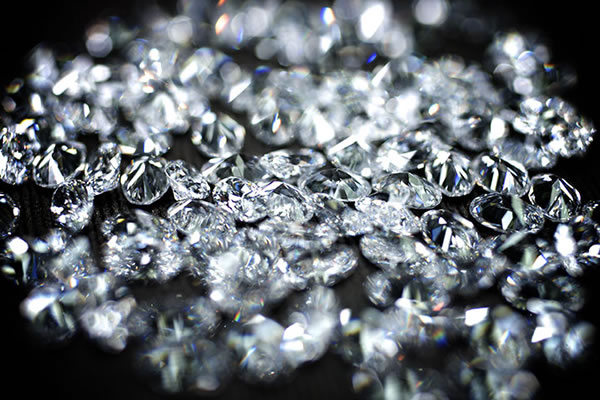 |
Pandora’s CSR people policy is said to be a human resource version of the 4C’s used to assess the value of a diamond: Cut, Clarity, Colour and Carat |
These 4C’s form the backbone of Pandora’s CSR people policy – a human resource version of the 4C’s used to assess the value of a diamond: Cut, Clarity, Colour and Carat.
“Over the last four to five years, Pandora has committed itself to expanding this philosophy to our suppliers, enabling them to provide good conditions for their staff, which result in higher productivity, better quality and ultimately better products at more competitive prices,” said Petersen.
*NOTE: The Moodie Report took a tour of Pandora Production Thailand in Bangkok’s Gempolis district last month. Click here or the link to The Moodie Blog in this story for our full account.
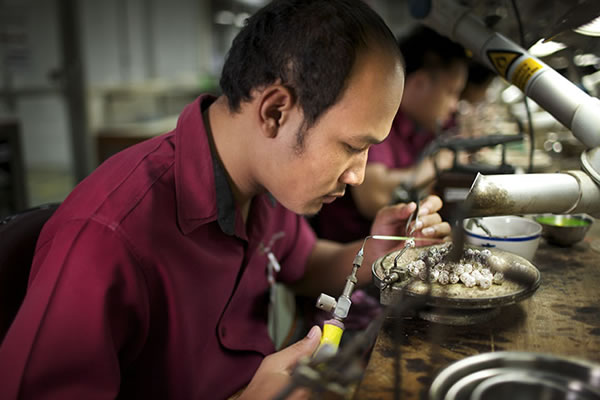 |
Pandora’s CSR commitment extends to its 8,000-strong workforce at its crafting facilities |

